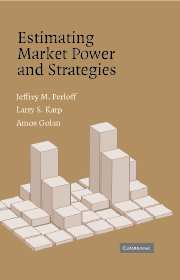Book contents
- Frontmatter
- Contents
- Foreword
- 1 Introduction and overview
- 2 Structure–Conduct–Performance
- 3 Industry Models of Market Power
- 4 Differentiated-Product Structural Models
- 5 Strategic Reasons for a Dynamic Estimation Model
- 6 Dynamic Games Involving Economic Fundamentals
- 7 Estimation of Dynamic Games Involving Economic Fundamentals
- 8 Estimation of Market Power Using a Linear-Quadratic Model
- 9 Estimating Strategies: Theory
- 10 Estimating Strategies: Case Studies
- Statistical Appendix
- Bibliography
- Answers
- Index
2 - Structure–Conduct–Performance
Published online by Cambridge University Press: 04 June 2010
- Frontmatter
- Contents
- Foreword
- 1 Introduction and overview
- 2 Structure–Conduct–Performance
- 3 Industry Models of Market Power
- 4 Differentiated-Product Structural Models
- 5 Strategic Reasons for a Dynamic Estimation Model
- 6 Dynamic Games Involving Economic Fundamentals
- 7 Estimation of Dynamic Games Involving Economic Fundamentals
- 8 Estimation of Market Power Using a Linear-Quadratic Model
- 9 Estimating Strategies: Theory
- 10 Estimating Strategies: Case Studies
- Statistical Appendix
- Bibliography
- Answers
- Index
Summary
Edward S. Mason's (1939, 1949) structure–conduct–performance (SCP) approach revolutionized the study of industrial organization by introducing the use of inferences from microeconomic analysis. In the SCP paradigm, an industry's performance – the success of an industry in producing benefits for consumers – depends on the conduct – behavior – of sellers and buyers, which depends on the structure of the market. The structure, in turn, depends on basic conditions such as technology and demand for a product. Typically, researchers summarize the structure by the number of firms or some other measure of the distribution of firms, such as the relative market shares of the largest firms.
Because the nature of these connections is usually not explained in detail, many economists criticize the SCP approach for being descriptive rather than analytic. George J. Stigler (1968) and others urged economists to use price-theory models based on explicit, maximizing behavior by firms and governments rather than the SCP method. Others suggested replacing the SCP paradigm with analyses that emphasized monopolistic competition (Chamberlin 1933, Hotelling 1929), game theory (von Neumann and Morgenstern 1944), or transaction costs (Williamson 1975). Indeed, the rest of this book concerns modern empirical alternatives to the SCP approach.
Mason and his colleagues at Harvard initially conducted case studies of individual industries (e.g., Wallace 1937). The first empirical applications of the SCP theory were by Mason's colleagues and students, such as Joe S. Bain (1951, 1956). In contrast to the case studies, these studies made comparisons across industries.
- Type
- Chapter
- Information
- Estimating Market Power and Strategies , pp. 13 - 41Publisher: Cambridge University PressPrint publication year: 2007

